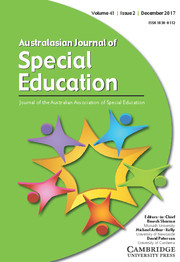Article contents
The Acquisition of Phonological Awareness and its Relationship to Reading in Individuals with Intellectual Disabilities
Published online by Cambridge University Press: 26 February 2016
Abstract
A review of research into the acquisition of phonological awareness skills in individuals with intellectual disabilities, the relationship between phonological awareness and reading in these individuals and the effect of phonological awareness training on the development of their phonological skills is presented. Research indicates that children with intellectual disabilities may take a different path to that of typically developing children in the acquisition of phonological skills. Despite this, there is more similarity than difference between the two groups in the relationship between phonological awareness and the acquisition of reading, the indication being that there is a positive relationship between phonological awareness and reading acquisition for individuals with intellectual disabilities. Moreover, the components of phonological awareness that can be associated with the acquisition of reading are similar for both groups. Limited data indicate that, as with typically developing children, the reading related skills of individuals with intellectual disabilities can be developed through explicit instruction that includes a phonological awareness component.
- Type
- Research Article
- Information
- Copyright
- Copyright © The Australian Association of Special Education 2006
References
- 3
- Cited by




